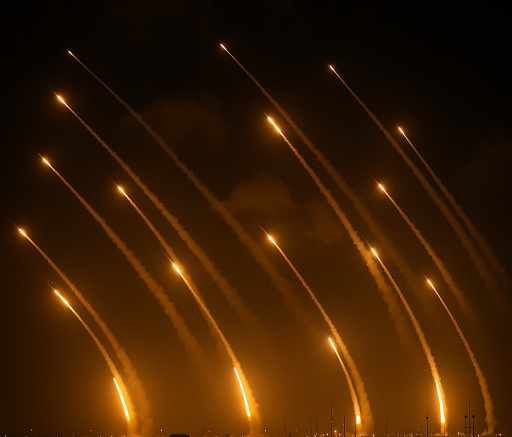On June 23, 2025, Iran launched a missile attack targeting the U.S. Al-Udeid Air Base in Qatar. This bold move marked a pivotal moment in the escalating Iran-U.S. conflict and introduced a new dimension to Gulf regional dynamics. Though no significant casualties were reported, the incident sparked global concern and prompted swift diplomatic and strategic responses.
Retaliation for Operation Midnight Hammer
Iran’s missile attack was a direct response to the U.S. military’s “Operation Midnight Hammer,” conducted just two days earlier. That operation involved targeted airstrikes on Iranian nuclear and military facilities. Iran’s leadership declared that the missiles were a proportional retaliation—”a missile for every bomb dropped.”
Strategic Messaging Without Escalation
Rather than inflicting maximum damage, Iran opted for a symbolic show of force. Iranian authorities reportedly warned Qatar in advance, which allowed the Gulf nation to close its airspace temporarily and minimize potential damage. This demonstrated Iran’s intent to avoid a full-blown war while affirming its resolve to defend national sovereignty.
Qatar’s Reaction: Sovereignty Challenged
Qatar condemned the missile strike, calling it a breach of sovereignty and a dangerous precedent. While reiterating its strategic alliance with the U.S., Qatar also maintained open communication with Tehran, signaling its preference for diplomatic containment over confrontation.
Despite limited physical damage, the political impact was severe, prompting Doha to reassess its regional security strategy and urging international allies to support its sovereignty.
International and Regional Response
GCC Condemnation and Heightened Security
Saudi Arabia, UAE, Bahrain, and other Gulf states issued firm condemnations, expressing alarm at Iran’s readiness to target neighboring countries. Most Gulf states elevated their military alert levels and tightened coordination with U.S. Central Command.
United States: Downplaying Iran’s Move
Former President Donald Trump, leading the current U.S. administration, described Iran’s retaliation as weak and theatrical. While the Pentagon kept forces on high alert, Washington refrained from an immediate military response—signaling a preference for strategic de-escalation.
Global Reactions: Call for Restraint
The European Union, China, Russia, and Turkey urged both nations to exercise restraint. The international community emphasized the importance of maintaining Gulf stability and avoiding actions that could jeopardize global energy security.
Strategic and Economic Implications
Oil Markets Remain Resilient
Despite initial fears, global oil prices remained stable. Experts attributed this to the limited nature of the strike and the absence of any disruption to infrastructure. However, analysts warned that further hostilities could shake markets and increase volatility.
Shifting Military Calculations
Regional military assets were repositioned. U.S. naval forces increased patrols in the Strait of Hormuz, and Gulf states began bolstering air defenses. The incident exposed vulnerabilities and the urgent need for a new regional defense architecture.
What Lies Ahead?
The Road to De-escalation
Qatar, Oman, and Turkey are actively pursuing diplomatic initiatives to prevent further escalation. Iran’s advance warning and the restrained U.S. response indicate an unspoken interest in containing the conflict.
Risk of Proxy Confrontation
Though direct conflict might be avoided, experts warn that tensions could spill into proxy battlegrounds like Iraq, Syria, and Yemen, where both Iranian and Western-aligned forces are already active.
Calls for a Gulf Security Framework
This crisis has reinvigorated calls for a multilateral Gulf security pact involving Iran, GCC nations, and international guarantors. Stability may only be achieved through inclusive regional dialogue.
Conclusion
The Iran missile attack on Qatar is a watershed moment in Middle Eastern geopolitics. While intended as a calibrated response, it underscores the fragility of the region and the necessity for a strategic rethink among Gulf states and global powers. As diplomatic efforts intensify, the hope remains that restraint, rather than retaliation, will shape the next phase of this evolving crisis.

